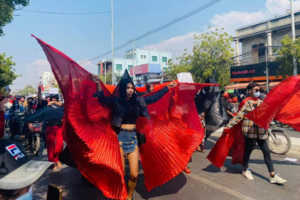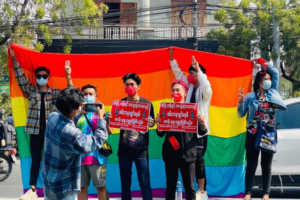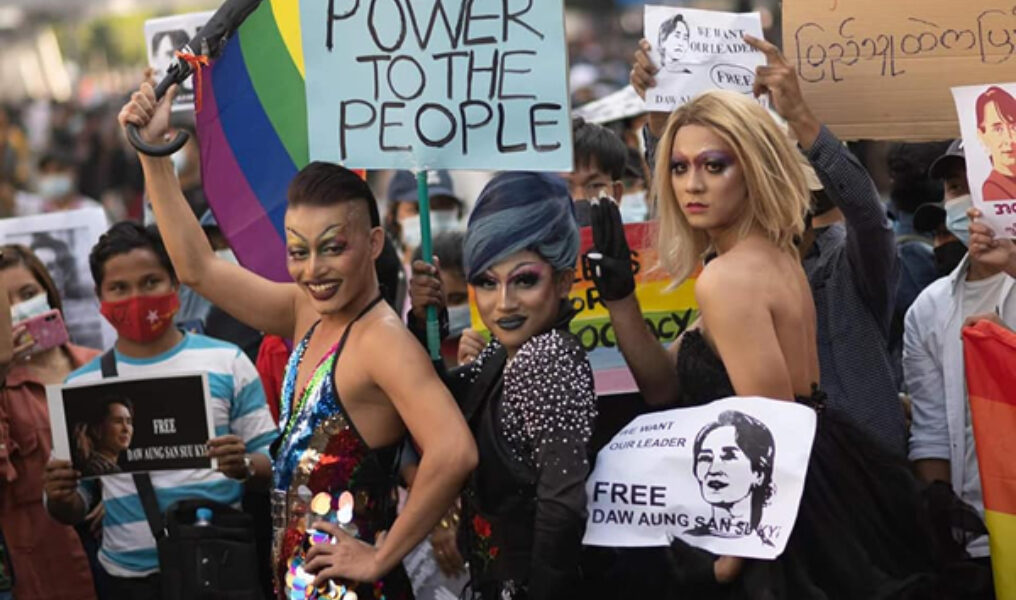By Michael K. Lavers and Victor Maung
LGBTQ activists in Myanmar have joined the growing protest movement against the Feb. 1 coup that ousted Aung San Suu Kyi and her democratically elected government.
Min Khant Zin, a drag queen who works at a gay bar in Yangon, the country's largest city, told the Washington Blade that he and his friends received a lot of media attention after they decided to participate in the protests while in drag. Khant Zin, who identifies as queer, added this decision was deliberate.
"Most of the openly gay people in Myanmar are makeup artists and cross-dressers. They do not stand out in the crowds when they wear female costumes, but someone with drag costumes will," said Khant Zin. "This is my intention."
"We want people around the world to know about the LGBT community's contributions for the fight for democracy," added Khant Zin.
Saw Zin Maung Soe is an LGBTQ activist who founded CAN Myanmar, a civil rights organization that is based in Mandalay, the country's second-largest city.
Maung Soe told the Blade that around 100 members — gay men and lesbians from different socio-economic backgrounds, gender queer people, straight allies, doctors and engineers — participated in a protest that took place in Mandalay on Feb. 8. Maung Soe said some of them were part of a group of protesters against whom the police used water canons and rubber bullets.
"We have to be cautious because we look different and are easily noticeable," Maung Soe told the Blade. "We are worried we might be targeted by the police forces and counter protesters."
"We are all coming to the protests to support the greater cause," added Maung Soe.
Khant Sithu, a Burmese college student in New York who identifies themselves as LGBTQ, is among those who have gathered in front of the U.N. to protest the coup.
"Regardless if you are gay or straight, we all vote for the political parties we like," Sithu told the Blade. "People in Myanmar have overwhelmingly voted for Aung San Suu Kyi's NLD party. Now, the military dislikes the situation and detain the civilian leaders."

LGBTQ activists in Mandalay, Myanmar, protest against the coup that toppled Burmese State Counselor Aung San Suu Kyi. (Courtesy photo)
The coup toppled Suu Kyi and her government less than three months after her National League for Democracy party trounced the military's Union Solidarity and Development Party in Parliamentary elections.
Suu Kyi, who won the Nobel Peace Prize in 1991, was under house arrest for nearly 15 years until her release in 2010. Suu Kyi in 2016 became Myanmar's state counselor, which is roughly equivalent to prime minister.
Suu Kyi, who has faced global criticism over her response to the plight of the Rohingya, has been charged with illegally possessing walkie-talkies. The U.S. is among the countries that have imposed sanctions against the Burmese military over the coup.
Consensual same-sex sexual relations remain criminalized in Myanmar under Section 377 of the country's Criminal Code.
Activists said Suu Kyi's government made an unofficial pledge to amend or repeal Article 377 and other anti-LGBTQ laws during its second term in office that would have ended in 2025.
Maung Sue told the Blade there was not "much progress for LGBT rights under Aung San Suu Kyi's NLD government's administration in the last five years."
"We LGBT activists got invited to observe the parliamentary sessions and we were asked to participate in policy dialogue," said Maung Soe. "The issue of LGBT rights was never a priority, even for the civilian government."
A group of activists have nevertheless released a statement that criticizes the coup and demands the release of Suu Kyi and other civilian leaders who have been detained.
"We LGBTI people in Myanmar demand the release of elected civilian leaders in detention, the cancellation of the new Administration Council formed with military officials and pro-military persons, the lifting of the military's intervention against convening of the new Parliament with elected members of Parliament," reads the statement.
"Since we, LGBTI people, have a history of active participation in past political activism, we want to announce that in this military coup, we will stand with the people and the government employees who are starting the civil disobedience campaigns," it adds.
Yuya, a transgender activist who spearheaded the letter, described it as a "statement by the LGBT people in Myanmar."
"We are human beings and we are citizens," Yuya told the Blade. "We have not been recognized because of the system, but we have tried to correct it. We do understand that we should not expect things to change 100 percent overnight, but we for sure do not want things to go back to ground zero and start again from scratch."
"So, like others, we participate in civil disobedience movements and others … we have many things to contribute to it, because we are all concerned," added Yuya. "Our leaders (referring to Suu Kyi) have fought for us. They were imprisoned for years in order for us to be here today. This is the time for us to contribute what we could for all of us again, so that generations may not suffer human rights abuses and this coup shall be the last one we experience."

LGBTQ activists in Mandalay, Myanmar, protest against the coup that toppled Burmese State Counselor Aung San Suu Kyi. (Courtesy photo)
This article originally appeared in the Washington Blade and is made available in partnership with the National LGBT Media Association.











